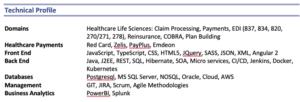Top Soft Skills to Add to Your Resume

There are certain components of your resume that are not negotiable, such as experience and education. But what about all the skills you’ve acquired? Sure, you’re likely keen to add the industry-specific skills you have on your resume under the experience section; that’s a given. But what about the inherent talents you have in your skillset? Often referred to as soft skills, these help paint a picture of the kind of person you are. What are some of those soft skills to add to your resume, and where should you put them?
Two Types of Skills: Hard and Soft
When it comes to the world of work, there are essentially two types of skills: hard and soft.
Hard skills
These are the things that are specific to your industry, such as project management, software engineering, performance analysis, regulatory compliance, and operations management. Hard skills are what you’ve acquired throughout your career by working in your field.
Soft skills
Soft skills, on the other hand, are independent of any industry. While only someone in IT or engineering would have skills such as software development or help desk support, anyone could include team leadership as a soft skill. These can also be classified as transferrable skills. You definitely want soft skills to add to your resume, regardless of your industry.
Choosing the Right Soft Skills to Add to Your Resume
While soft skills span numerous industries, not everyone should have all of them on their resume. There are customer-facing skills, technical skills, and operational skills—just to name a few. As with any skills you add to your resume, you should choose them initially from the job description.
Most job descriptions include similar components, namely:
- Job description, or essential duties and responsibilities
- About the company
- Qualifications
These can be called different things, such as “your role,” “job function,” “what we’re looking for,” and “the successful candidate will have…,” among others. To be sure you’re pulling the correct skills, peruse the job description and look for these categories. You’ll start to see patterns (most job descriptions look similar). There will be a mix of technical, or hard, skills, along with the soft skills to add to your resume.
Where to Put Soft Skills on Your Resume
On a well-formatted resume, you’ll have a summary and areas of expertise in the top third of the document, just below your contact information and title. Areas of expertise (sometimes called core competencies) is another word for keywords, and this is where you’ll put your skills, both hard and soft. You can also incorporate skills into your summary, especially those that don’t work well as standalone keywords.
An example of an areas of expertise section is below. Some of the soft skills to add to your resume may include:
- Communication
- Cross-team collaboration
- Time management
- Customer service
- Stakeholder relations
- Problem solving
- Interpersonal skills
- Critical thinking
- Team leadership
- Strategic planning
- Presentation skills
- Process improvements
And you can likely think of several more soft skills that you bring to the table.

A Word about Technical Skills
If you are in IT or engineering, you may benefit from having an additional skills section, which is your technical profile. This will directly follow your summary and areas of expertise. It is best separated into categories, as you’ll see in the example below. If you do have some technical skills that the job description requests, such as Excel or Word, but you’re not in IT and it doesn’t make sense to include a full technical profile, you can incorporate those into your areas of expertise section.

Need Help Developing Your Resume?
If you’re lucky, you’ll only have to write a resume a few times in your career. Unfortunately, that means that your skills in doing so may not be up to par with the requirements in today’s marketplace. If that’s the case, a better option is to outsource the task of resume writing to a professional.
At Resume and Career Services, we have nearly 30 years of experience creating resumes that get interviews. Plus, through our connection to Blue Signal, we know what recruiters are looking for and give you a leg up on the competition. On average, it can take up to six months for an executive to land a new position, but we are committed to reducing that time to as short as eight weeks. Learn more about how we can help you build a better resume and get faster results.
